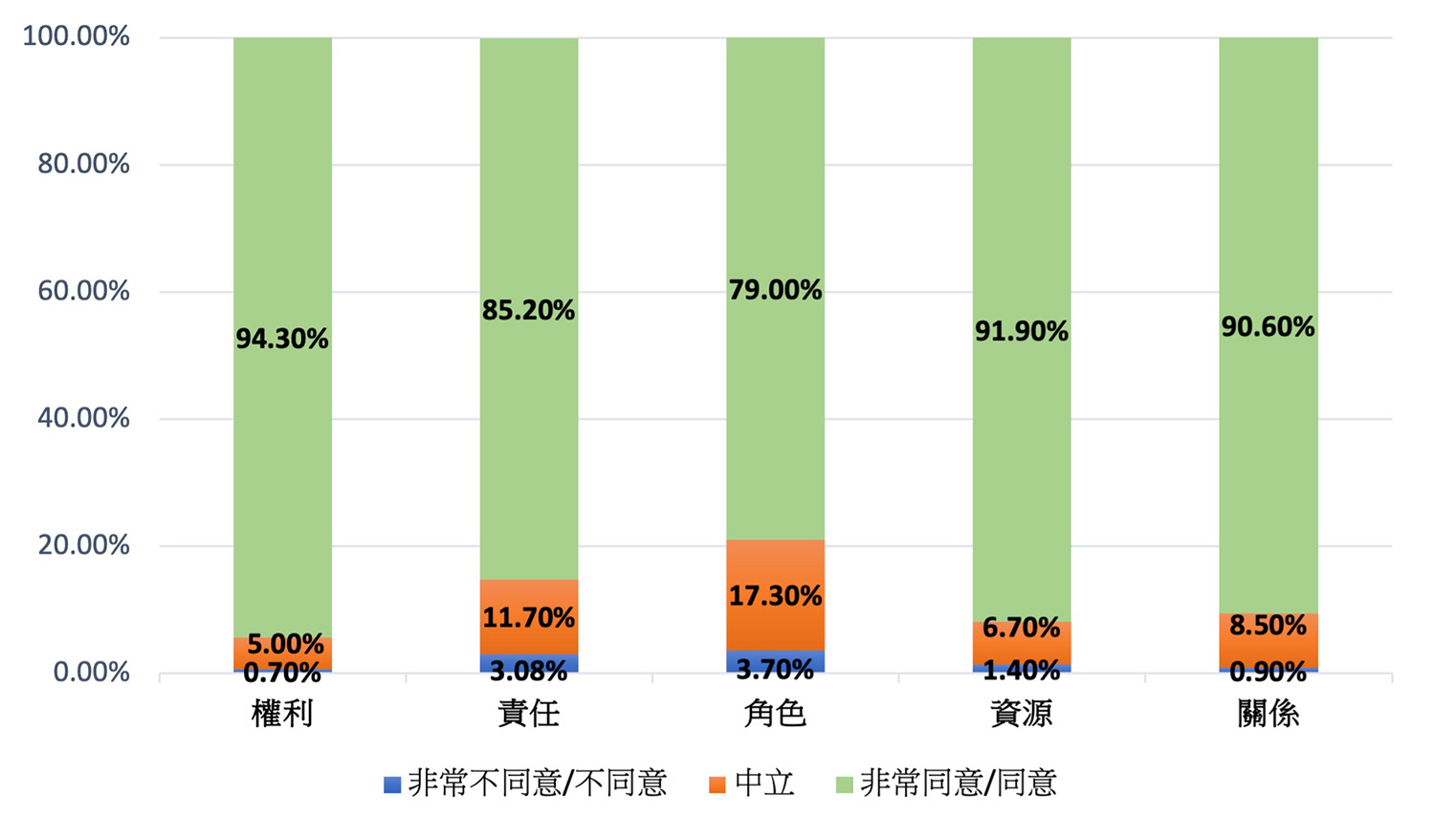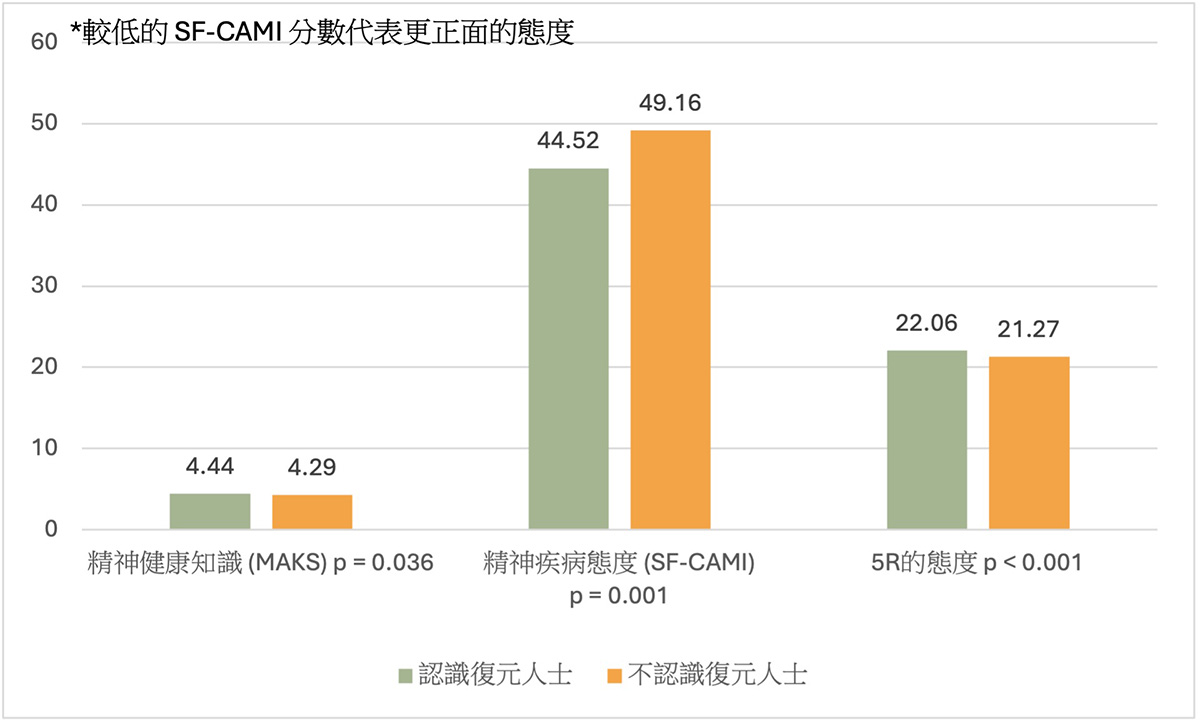社區對復元公民和精神疾病的認識和態度:電話調查
Wong, F.Y.Y., Wong, K.K.L., Lam, P.C.W., Chin, L.Y. and Fung, C.T. (2023). Community knowledge and attitudes toward recovering citizenship and mental illness: a telephone survey approach. Journal of Public Mental Health, Vol. 22 No. 3, pp. 133-145. https://doi.org/10.1108/JPMH-08-2022-0086
背景及簡介
近年,復元公民的概念在精神健康服務中受到越來越多的關注(Rowe, 2001)。鑑於復元公民和5R(包括:權利、責任、角色、資源和關係)的發展,以及市民對精神疾病認識和態度的研究有限,因此我們進行了電話問卷調查和焦點小組訪談。
研究時期
2021年1月至2月
目標人群
年滿18歲、能用粵語溝通及有能力完成電話調查的香港人。
目的
- 以電話問卷調查的方式評估香港18歲或以上人士對復元公民、復元人士可擁有5R以及精神疾病的認識和態度。
- 評估影響復元公民、5R和精神疾病的知識和態度的因素。
方法
電話問卷調查由一所本地大學的研究中心負責進行。電話號碼是從政府的編號計劃中隨機抽取的。問卷包括兩個已認證的量表,用於衡量對精神疾病的認識和態度 (Evans-Lacko et al, 2010; Tong et al, 2020; Zhu et al, 2016),以及有關對復元人士擁有5R的看法。
結果
- 共有 1009 位受訪者完成了電話調查。
- 精神疾病認識平均分數較高,為 4.37 ± 1.08(最高分數:6)(表 1)。
- 對精神疾病的態度平均分為46.50 ± 8.74(最高分數:100)。分數愈低代表態度愈正面。調查顯示受訪者對精神復元人士的恐懼和排斥程度較低,其次是支持與寬容和仁慈(表 1)。
- 57%的受訪者表示沒有聽過復元公民的基本概念。受訪者普遍對復元人士擁有 5R持正面態度(圖 1)。
- 那些對精神疾病有更多認識(p < 0.001)和更正面態度(p < 0.001)的受訪者明顯更支持復元人士可擁有5R。
- 認識患有精神疾病或復元人士的受訪者比不認識精神疾病患者或復元人士的受訪者在精神疾病方面的認識顯著更高(p = 0.036),並且對精神疾病(p < 0.001)和5R(p < 0.001)持更正面的態度(圖 2)。
表1. 對精神疾病的認識與態度得分
量表 總分
(平均值±標準差) 題目平均得分
(平均值±標準差) 精神健康知識進度表(MAKS) 4.37 ± 1.08 / 精神疾病態度量表(SF-CAMI) 46.50 ± 8.74 2.32 ± 0.44 仁慈 12.71 ± 2.92 2.54 ± 0.58 恐懼和排斥 17.05 ± 3.95 2.13 ± 0.49 支持與寬容 16.74 ± 3.51 2.39 ± 0.50
圖1. 對5R的態度

圖2. 認識復元人士與否在精神疾病/5R的認識與態度得分

結論
- 據研究員所知,這是首個評估香港市民對復元公民的認識和態度的調查。
- 受訪者對精神疾病有較好的認識,但對精神疾病復元的認識以及對復元人士的同理心仍有待進一步提高。
- 要承認復元人士在社區的存在價值和潛在貢獻,社會需要宣揚復元公民概念並讓復元人士在社區中擔任重要角色,來促進社會對復元人士和復元公民的包容和接受。
參考文獻
Evans-Lacko, S., Little, K., Meltzer, H., Rose, D., Rhydderch, D., Henderson, C., & Thornicroft, G. (2010). Development and psychometric properties of the mental health knowledge schedule. The Canadian Journal of Psychiatry, 55(7), 440-448.
Rowe, M., Kloos, B., Chinman, M., Davidson, L., & Cross, A. B. (2001). Homelessness mental illness, and citizenship. Social Policy & Administration, 35(1), 14-31.
Tong, Y., Wang, Z., Sun, Y., & Li, S. (2020). Psychometric Properties of the Chinese Version of Short-Form Community Attitudes Toward Mentally Illness Scale in Medical Students and Primary Healthcare Workers. Frontiers in Psychiatry, 11, 337.
Zhu, S., Tse, S., Tang, J., & Wong, P. (2016). Knowledge, attitudes and behaviors associated with mental illness among the working population in Hong Kong: a cross-sectional telephone survey. International Journal of Culture and Mental Health, 9:3, 313-325.
Publisher: Emerald Publishing Limited
Copyright © 2023, Fiona Yan-yan Wong, Keith Kin-lung Wong, Paul Chi-wai Lam, Lok-yan Chin and Cheung-tim Fung.
License
Published by Emerald Publishing Limited. This article is published under the Creative Commons Attribution (CC BY 4.0) license. Anyone may reproduce, distribute, translate and create derivative works of this article (for both commercial & non-commercial purposes), subject to full attribution to the original publication and authors. The full terms of this license may be seen at http://creativecommons.org/licences/by/4.0/legalcode
Wong, F.Y.Y., Wong, K.K.L., Lam, P.C.W., Chin, L.Y. and Fung, C.T. (2023). Community knowledge and attitudes toward recovering citizenship and mental illness: a telephone survey approach. Journal of Public Mental Health, Vol. 22 No. 3, pp. 133-145. https://doi.org/10.1108/JPMH-08-2022-0086
背景及簡介
近年,復元公民的概念在精神健康服務中受到越來越多的關注(Rowe, 2001)。鑑於復元公民和5R(包括:權利、責任、角色、資源和關係)的發展,以及市民對精神疾病認識和態度的研究有限,因此我們進行了電話問卷調查和焦點小組訪談。
研究時期
2021年1月至2月
目標人群
年滿18歲、能用粵語溝通及有能力完成電話調查的香港人。
目的
- 以電話問卷調查的方式評估香港18歲或以上人士對復元公民、復元人士可擁有5R以及精神疾病的認識和態度。
- 評估影響復元公民、5R和精神疾病的知識和態度的因素。
方法
電話問卷調查由一所本地大學的研究中心負責進行。電話號碼是從政府的編號計劃中隨機抽取的。問卷包括兩個已認證的量表,用於衡量對精神疾病的認識和態度 (Evans-Lacko et al, 2010; Tong et al, 2020; Zhu et al, 2016),以及有關對復元人士擁有5R的看法。
結果
- 共有 1009 位受訪者完成了電話調查。
- 精神疾病認識平均分數較高,為 4.37 ± 1.08(最高分數:6)(表 1)。
- 對精神疾病的態度平均分為46.50 ± 8.74(最高分數:100)。分數愈低代表態度愈正面。調查顯示受訪者對精神復元人士的恐懼和排斥程度較低,其次是支持與寬容和仁慈(表 1)。
- 57%的受訪者表示沒有聽過復元公民的基本概念。受訪者普遍對復元人士擁有 5R持正面態度(圖 1)。
- 那些對精神疾病有更多認識(p < 0.001)和更正面態度(p < 0.001)的受訪者明顯更支持復元人士可擁有5R。
- 認識患有精神疾病或復元人士的受訪者比不認識精神疾病患者或復元人士的受訪者在精神疾病方面的認識顯著更高(p = 0.036),並且對精神疾病(p < 0.001)和5R(p < 0.001)持更正面的態度(圖 2)。
表1. 對精神疾病的認識與態度得分
| 量表 | 總分 (平均值±標準差) | 題目平均得分 (平均值±標準差) |
| 精神健康知識進度表(MAKS) | 4.37 ± 1.08 | / |
| 精神疾病態度量表(SF-CAMI) | 46.50 ± 8.74 | 2.32 ± 0.44 |
| 仁慈 | 12.71 ± 2.92 | 2.54 ± 0.58 |
| 恐懼和排斥 | 17.05 ± 3.95 | 2.13 ± 0.49 |
| 支持與寬容 | 16.74 ± 3.51 | 2.39 ± 0.50 |
圖1. 對5R的態度

圖2. 認識復元人士與否在精神疾病/5R的認識與態度得分

結論
- 據研究員所知,這是首個評估香港市民對復元公民的認識和態度的調查。
- 受訪者對精神疾病有較好的認識,但對精神疾病復元的認識以及對復元人士的同理心仍有待進一步提高。
- 要承認復元人士在社區的存在價值和潛在貢獻,社會需要宣揚復元公民概念並讓復元人士在社區中擔任重要角色,來促進社會對復元人士和復元公民的包容和接受。
參考文獻
Evans-Lacko, S., Little, K., Meltzer, H., Rose, D., Rhydderch, D., Henderson, C., & Thornicroft, G. (2010). Development and psychometric properties of the mental health knowledge schedule. The Canadian Journal of Psychiatry, 55(7), 440-448.
Rowe, M., Kloos, B., Chinman, M., Davidson, L., & Cross, A. B. (2001). Homelessness mental illness, and citizenship. Social Policy & Administration, 35(1), 14-31.
Tong, Y., Wang, Z., Sun, Y., & Li, S. (2020). Psychometric Properties of the Chinese Version of Short-Form Community Attitudes Toward Mentally Illness Scale in Medical Students and Primary Healthcare Workers. Frontiers in Psychiatry, 11, 337.
Zhu, S., Tse, S., Tang, J., & Wong, P. (2016). Knowledge, attitudes and behaviors associated with mental illness among the working population in Hong Kong: a cross-sectional telephone survey. International Journal of Culture and Mental Health, 9:3, 313-325.
Publisher: Emerald Publishing Limited
Copyright © 2023, Fiona Yan-yan Wong, Keith Kin-lung Wong, Paul Chi-wai Lam, Lok-yan Chin and Cheung-tim Fung.
License
Published by Emerald Publishing Limited. This article is published under the Creative Commons Attribution (CC BY 4.0) license. Anyone may reproduce, distribute, translate and create derivative works of this article (for both commercial & non-commercial purposes), subject to full attribution to the original publication and authors. The full terms of this license may be seen at http://creativecommons.org/licences/by/4.0/legalcode





